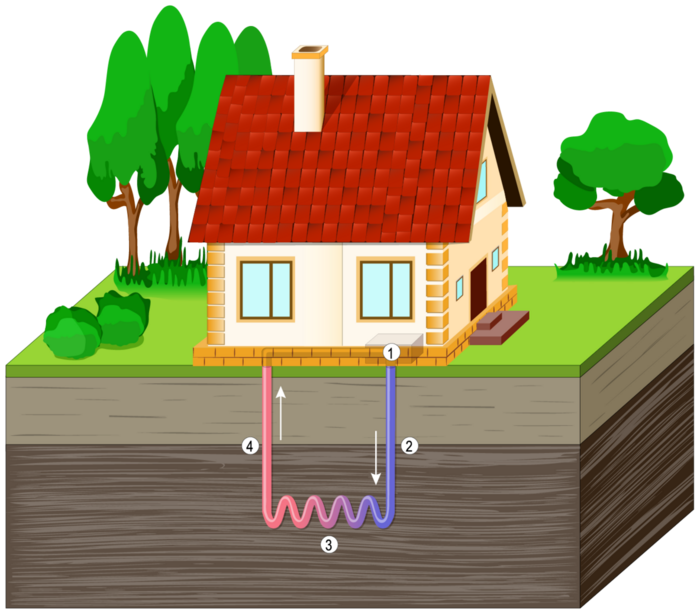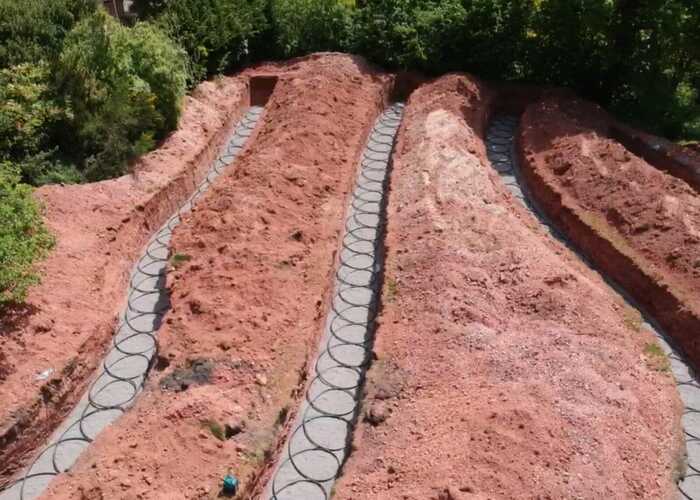Ground Source Heat Pumps: Pros and Cons
Thinking of installing a ground source heat pump in your property? Let us guide you through some of the pros and cons to consider before making the investment.
Your Local Renewables Company

Evergreen are experienced installers of Ground Source Heat Pumps across Dorset, Devon and Somerset, enabling you to heat your home in an environmentally friendly way and qualify for the BUS Boiler Upgrade Scheme.
Evergreen have a great team of qualified, experienced and product trained engineers. We have been installing renewable technologies throughout Dorset, Devon and Somerset since 2011.
We fit the excellent and British made Kensa Heat Pumps. See their website for further information: www.kensaheatpumps.com

WHAT IS A
GROUND SOURCE
HEAT PUMP?

WHAT ARE THE MAIN ADVANTAGES OF A GROUND SOURCE HEAT PUMP?

HOW DOES A GROUND
SOURCE HEAT PUMP
ACTUALLY WORK?

METHODS OF
OBTAINING
NATURAL HEAT

CASE STUDIES OF GROUND SOURCE HEAT PUMP INSTALLATIONS

Ground source heat pumps are extremely energy efficient, for every one unit of electricity used (to drive the pump and compressor), around 4 units of heat are produced. Buried pipes or ‘slinkies’ are used to absorb heat from the ground. Other methods include ‘pond mats’ or ‘open loop’ systems which take heat from ponds, lakes or rivers.


This short video by Kensa Heat Pumps gives a great explanation of what a heat pump is and how a ground source heat pump works. Evergreen are accredited installers for Kensa Ground Source Heat Pumps and have worked with them since 2015.
Evergreen are the leading Ground Source Heat Pump
installation company in Dorset, Devon & Somerset
Heat pumps run on electricity. Running costs are comparable with natural gas fired systems, and lower than oil, LPG or existing all electric systems. If you have a solar PV system, then free self-generated power can contribute to the running of the heat pump, further reducing running costs
Heat pumps are a green technology. Heat pumps do have an impact on the environment as they need electricity to run. However, they are very efficient and the electricity grid is getting greener, relying less on fossil fuels. The heat extracted from the ground or water source is constantly being renewed naturally.
No LPG or oil deliveries required, and no connection to the gas grid needed either. Heat pumps run on electricity and most homes are already connected to the electricity grid. For this reason heat pumps are often ideal for properties in rural or more isolated locations.
The government backed Boiler Upgrade Scheme (BUS) supports the decarbonisation of heat in buildings. It provides upfront capital grants to support the installation of heat pumps and in homes and non-domestic buildings in England and Wales. Acting on behalf of property owners, installers can apply for £7,500 towards the installation of a Ground Source Heat Pump.
Heat pumps are very reliable. We recommend annual servicing to ensure your heat pump runs efficiently for many years.

MCS is a mark of quality. Using an MCS certified installer ensures that equipment meets good standards of performance and that installers are technically safe and competent. MCS certified Installers have undergone a rigorous vetting process to demonstrate that they adhere to MCS Standards.
"It is a pleasure, but very rare, to be in a position to write to any firm to tell them that we are most happy with their service. From the first day we contacted yourselves we have noticed a positive ‘can do’ attitude, and this has been justified by the actions and results since that day. The positivity has been reinforced by each member of the company we have had contact with, and the quality of the work that has been done and is apparent backs up the assurances given.
The depth of knowledge that has been demonstrated, and has been proven, has given us a degree of peace of mind; specifically we were most impressed that when we were faced with a potential difficulty in regards to power supply you went the extra mile and, through discussions with Kensa Heat Pumps, were able to re-engineer matters to resolve the situation.
Whilst we have had specific contact with Paul and Ian, and those who installed the Ground Source Heat Pumps on site, we are sure that all the team including those backroom staff whom we might not have dealt with directly are of the same positive attitude and professionalism.
Thank you all. We are delighted with the service we have had from Evergreen."

Pipes are buried in the ground or submerged in water. A fluid is circulated through this 'closed loop' picking up heat as travels.

Water is extracted from a river or other water source and is passed through a heat exchanger before being returned.